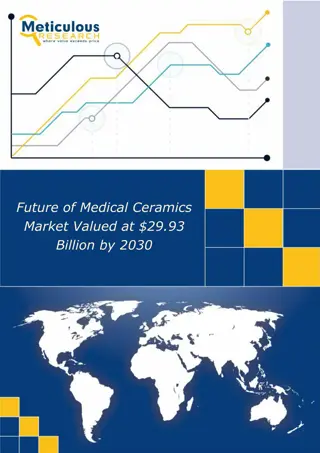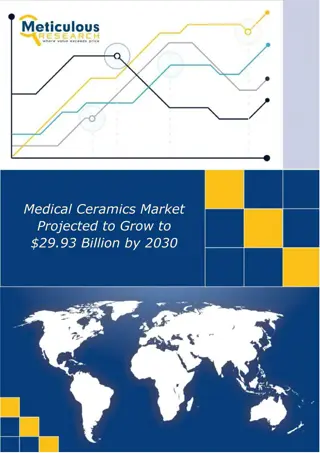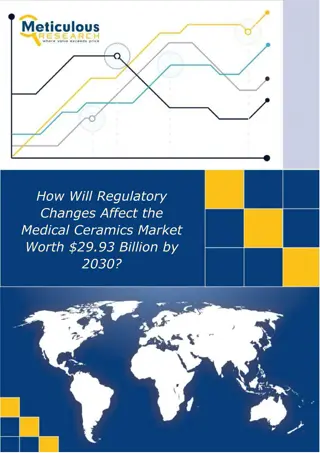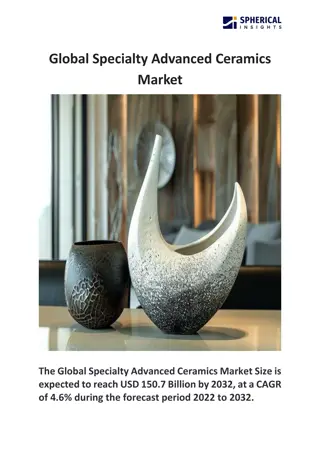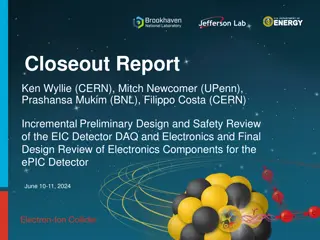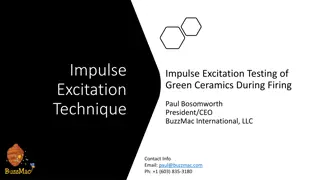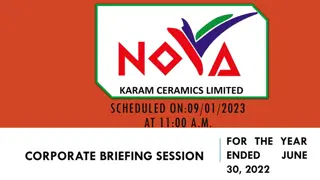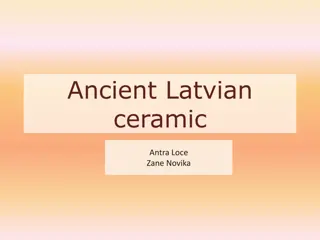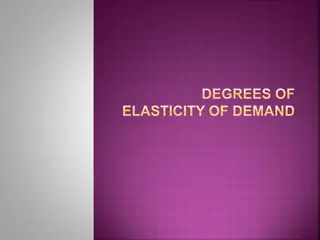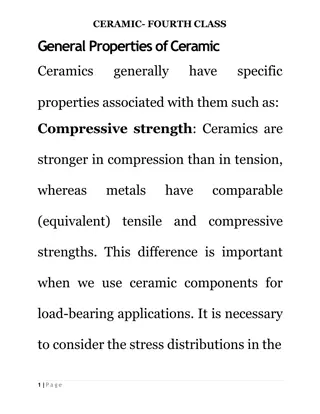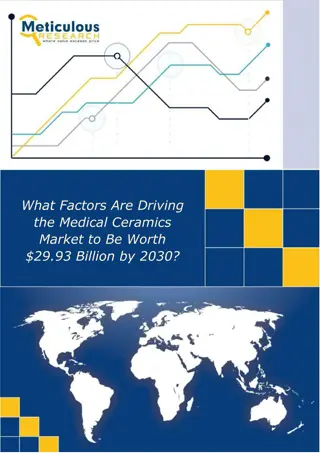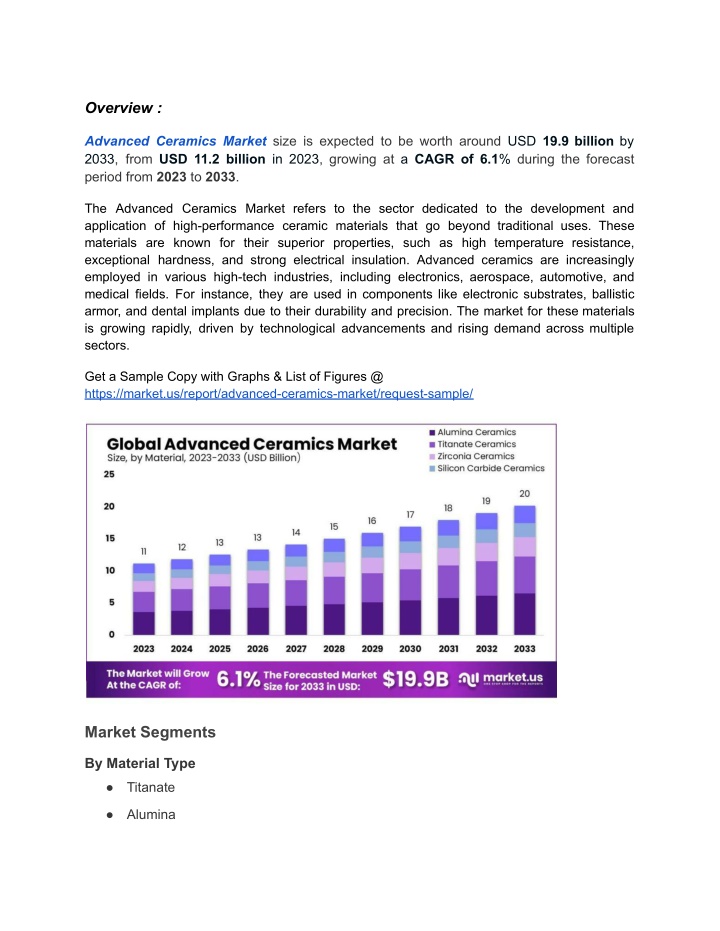
Advanced Ceramics Market Eyes Robust Growth as Demand in Medical and Electronics
Advanced Ceramics Market By Material Type (Titanate, Alumina, Ferrite, Zirconate, Other Material Types), By Application (Monolithic Ceramics, Ceramic Coatings Ceramic Filters, Others), By End-use Industry (Electrical & Electronics, Transportation, Me
Download Presentation

Please find below an Image/Link to download the presentation.
The content on the website is provided AS IS for your information and personal use only. It may not be sold, licensed, or shared on other websites without obtaining consent from the author. If you encounter any issues during the download, it is possible that the publisher has removed the file from their server.
You are allowed to download the files provided on this website for personal or commercial use, subject to the condition that they are used lawfully. All files are the property of their respective owners.
The content on the website is provided AS IS for your information and personal use only. It may not be sold, licensed, or shared on other websites without obtaining consent from the author.
E N D
Presentation Transcript
Overview : Advanced Ceramics Market size is expected to be worth around USD 19.9 billion by 2033, from USD 11.2 billion in 2023, growing at a CAGR of 6.1% during the forecast period from 2023 to 2033. The Advanced Ceramics Market refers to the sector dedicated to the development and application of high-performance ceramic materials that go beyond traditional uses. These materials are known for their superior properties, such as high temperature resistance, exceptional hardness, and strong electrical insulation. Advanced ceramics are increasingly employed in various high-tech industries, including electronics, aerospace, automotive, and medical fields. For instance, they are used in components like electronic substrates, ballistic armor, and dental implants due to their durability and precision. The market for these materials is growing rapidly, driven by technological advancements and rising demand across multiple sectors. Get a Sample Copy with Graphs & List of Figures @ https://market.us/report/advanced-ceramics-market/request-sample/ rk t gm nt By Material Type Titanate Alumina
Ferrite Zirconate Other Material Types By Application Monolithic Ceramics Ceramic Coatings Ceramic Filters Others By End-use Industry Electrical & Electronics Transportation Medical Defence & Security Environmental Chemical Others In 2023, alumina led the advanced ceramics market with over 32.2% revenue share, favored for its thermal stability and wear resistance in extreme applications like mechanical seals and ballistic armor. Titanate, which is crucial for microwave communication systems, is anticipated to grow rapidly due to increased investments in wireless technologies. Monolithic ceramics, holding 74.4% of the market, are dominant due to their durability and high-temperature resistance in electronic devices and vehicles. Meanwhile, ceramic matrix composites (CMCs) are projected to grow fastest at 5.3%, offering enhanced properties such as lightness and strength. In the end-use sector, electronics led with 44.1% revenue in 2023, while bio ceramics are set to expand rapidly, driven by their growing use in medical applications and innovative products like bio-ceramic watches. Market Key Players The 3M Company. AGC Ceramics Co., Ltd. CeramTec GmbH
CoorsTek Inc. Elan Technology KYOCERA Corporation Morgan Advanced Materials Murata Manufacturing Co., Ltd. Nishimura Advanced Ceramics Co., Ltd. Ortech Advanced Ceramics Other Key Players Drivers: The growing demand for advanced ceramics in the medical and electronics sectors is a major driver of market expansion. In the medical field, these materials are crucial for implants, artificial joints, and devices like pacemakers due to their resistance to heat and chemicals. This makes them ideal for high-performance medical applications. Restraints: The inherent brittleness of advanced ceramics, such as alumina and zirconia, poses a significant challenge. These materials can be prone to fracture under impact or stress, limiting their application in environments subjected to high forces or vibrations. This fragility can affect their reliability and performance in critical applications. Opportunity: Advanced ceramics are finding new opportunities in nanotechnology, where their small-scale variants enhance material properties. These tiny ceramic particles are being incorporated into aerospace and automotive components, offering improved strength and reduced weight. This innovation opens up new possibilities for using advanced ceramics in cutting-edge technologies.
Challenge: The high production cost of advanced ceramics presents a challenge for widespread adoption. The specialized equipment and high-quality raw materials required for manufacturing make these ceramics more expensive than conventional materials. Finding cost-effective production methods and alternative materials is crucial for making advanced ceramics more affordable and accessible.




